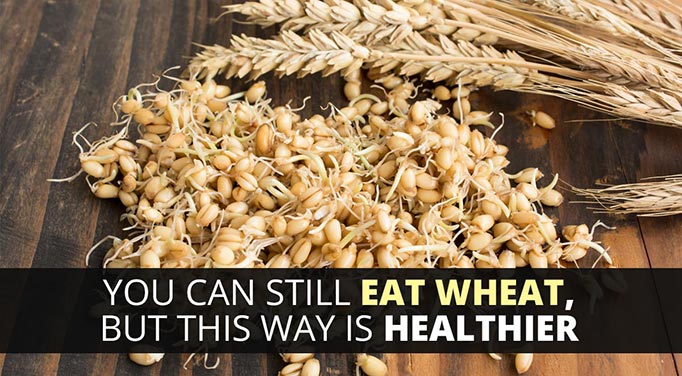
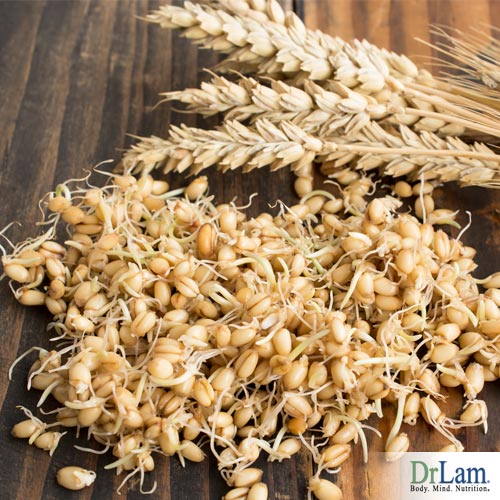 A wheat intolerance in any form whether it be from an allergy or disease is the most common allergy found in children and affects millions of adult Americans as well. Having a wheat-free diet is extremely attainable. It does take a bit of effort, however, as the product is a very common element in the American diet and found in many things. Sprouted wheat is known to contain less gluten, which is a bonus for those who also have a sensitivity to gluten.
A wheat intolerance in any form whether it be from an allergy or disease is the most common allergy found in children and affects millions of adult Americans as well. Having a wheat-free diet is extremely attainable. It does take a bit of effort, however, as the product is a very common element in the American diet and found in many things. Sprouted wheat is known to contain less gluten, which is a bonus for those who also have a sensitivity to gluten.
According to the Centers for Disease Control & Prevention it has been reported that the prevalence of food allergy in children has increased by 50 percent between the years of 1997 and 2011, and between the years of 1997 and 2008, the prevalence of peanut or tree nut allergy appears to have more than tripled among children in the U.S.
Although the answers to this epidemic are currently unknown, there is a lot of research being poured into it, and much speculation as to what is causing these harmful reactions to foods that our bodies have been processing and digesting for years.
One such theory is in the way our foods are now being treated and processed, and many people are looking at other viable food options, such as consuming sprouted wheat, going gluten free, or eating organic, untreated or unprocessed foods. Even those who have no allergies or intolerances are choosing these healthier and wiser food choices, and here is why:
It has become pretty common knowledge among the general public that whole wheat bread is healthier than white bread. There is now an even healthier option that’s gaining some recognition in the health food market and that is for sprouted grains. As a new entrant in the industry, many people are unaware of what it is, how it is processed, and its benefits.
Sprouting the seeds before baking releases all the vital nutrients stored in the whole grains and seeds. Sprouting before baking produces a living, nutrient-rich food. Isn’t that the goal? The flour made from these grains provides more protein, vitamins, and minerals than refined flours, which in many cases, are technically dead food, especially after being bleached and processed.
One of the major benefits of sprouted wheat is that it also neutralizes phytic acid, a substance present in grains, which inhibits absorption of nutrients. By definition, a grain is the seed of the plant and contains three edible parts: the germ, the endosperm, and the bran. During the conventional method of processing and refining the grains, the germ and the bran are removed to increase shelf-stability.
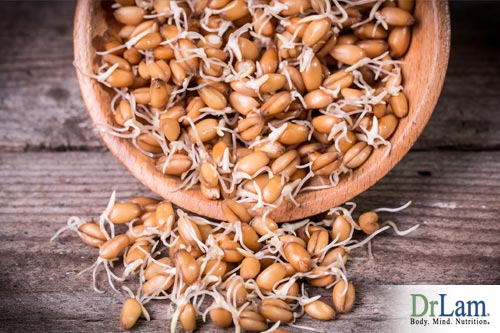 Unfortunately, the germ and the bran are the parts that contain the majority of nutrients such as the fiber, vitamins, minerals, and antioxidants. White bread is created by removing the germ and bran found in the wheat’s kernel, home to all the nutrients, and then grinding only the endosperm into flour. Whole-wheat bread is made by grinding wheat kernels into whole-wheat flour. Whole wheat provides fiber, and naturally-occurring vitamins and proteins, however, it still does not provide all the nutrients it could if it was allowed to sprout first.
Unfortunately, the germ and the bran are the parts that contain the majority of nutrients such as the fiber, vitamins, minerals, and antioxidants. White bread is created by removing the germ and bran found in the wheat’s kernel, home to all the nutrients, and then grinding only the endosperm into flour. Whole-wheat bread is made by grinding wheat kernels into whole-wheat flour. Whole wheat provides fiber, and naturally-occurring vitamins and proteins, however, it still does not provide all the nutrients it could if it was allowed to sprout first.
Sprouted wheat offers increased digestibility. In fact, the sprouting process almost pre-digests the starches for you by breaking them down into simple sugars. It also has an increased absorption of minerals and increased antioxidants.
As more research is being conducted on the health benefits of sprouted grains, the evidence is clearly showing that sprouting may increase many of the grain’s essential nutrients, including B-vitamins, Vitamin C, soluble fiber and essential amino acids. Lysine found in the sprouted wheat is a vital amino acid that can also be found in high-protein foods like eggs and red meat, but yet it’s very limited or nonexistent in the conventional method of processing grains.
Another enzyme that can be elevated in sprouted grains is amylase, which breaks down starches into sugars. Increased levels of this enzyme are what helps to heighten the grain’s digestibility. Sprouted rye seeds even increase its folate content up to 3.8-fold!
The bottom line? Sprouted wheat contains more protein and less fat than is found in non-sprouted wheat used to make other bread. According to a study done by the US Department of Agriculture, sprouted grains contain about 75 percent of the carbohydrates compared to whole grains. They also contain more protein and about 40 percent of the fat of whole grains. With the higher nutrient count of sprouted foods, this gives people yet another vegetarian or vegan option to add to their diets.
Sprouted grains are known to contain less gluten, which is a bonus for those who are gluten-sensitive. While it is not “gluten free”, it can be much easier on the digestion, and an option for slightly gluten-sensitive individuals. May it be clearly known, however, that sprouted bread is not recommended for Celiac patients or those with true gluten allergies and intolerances. Gluten free is a term that has come to receive a lot of attention these days as sensitivities to wheat arise. It isn’t only for those suffering from Celiac disease or wheat sensitivities, it is being chosen by people for many health benefits as well.
Here are the reasons many people have chosen to go gluten free and with sprouted wheat:
Those are significant reasons to carefully monitor your intake of gluten, consider only using sprouted grains, or become gluten free.
 One of the worst things caused by far from consuming refined, processed, and unsprouted kinds of wheat is the inflammation factor that it can have. If inflammation of any sort is found in your body, the cause needs to be pinpointed and eliminated as soon as possible. To best understand how this works, it is a good idea to take a look at the body’s inflammation circuit.
One of the worst things caused by far from consuming refined, processed, and unsprouted kinds of wheat is the inflammation factor that it can have. If inflammation of any sort is found in your body, the cause needs to be pinpointed and eliminated as soon as possible. To best understand how this works, it is a good idea to take a look at the body’s inflammation circuit.
Inflammation, essentially, is the body’s response to stress of any kind. It could be stress derived from a physical or a psychological mechanism, and we now know it could be food related. In fact, there are many causes of chronic inflammation that results in the inflammation circuit becoming unbalanced.
Physical stress could be that of an injury from falling or becoming sick. Psychological stress can be the typical stress we associate with emotions, an argument, work, finances, etc. Inflammation is the result of a series of unhealthy changes in your body and needs to be seriously addressed.
Inflammation is a signal that arises at the molecular and cellular level that changes your normal physiological responses. Some common causes of inflammation that can alter the body include:
It’s been stated by some researchers that up to 90 percent of all diseases can be linked back to the gut and health of the microbiome. The microbiome is home to trillions of microbes which are diverse organisms that help govern nearly every function of the human body. The importance of a healthy gut and microbiome cannot be emphasized enough.
Overall health, fertility, and longevity are highly correlated to the efficient balance of the living microbiome. It is therefore extremely important to ensure that we consume food that enhances and assists in keeping these systems balanced, which is where sprouted wheat and healthy foods come into play.
The lower the amount of unnecessary stress we can impose on our body, such as eating foods that are hard to digest, cause inflammation, or allergic reactions, the better the systems of our body will operate.
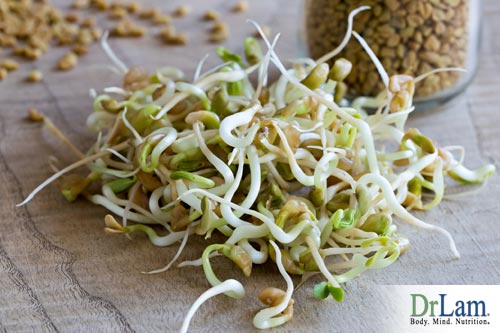 The nutritional facts on the labels of food items do not indicate how a particular food will be digested by the body. Unsprouted whole grain flours are starches that require pancreatic enzymes to digest. Properly sprouted wheat made from sprouted whole grains is actually classified as a vegetable by the USDA.
The nutritional facts on the labels of food items do not indicate how a particular food will be digested by the body. Unsprouted whole grain flours are starches that require pancreatic enzymes to digest. Properly sprouted wheat made from sprouted whole grains is actually classified as a vegetable by the USDA.
The better, healthier choice in grains? Choosing sprouted wheats and other sprouted foods put much less stress on your digestion, leaving a healthier operating microbiome, and have a multitude of other health benefits:
Boosts the gastrointestinal tract and stabilizes blood sugar and helps body odor. Fennel sprouts are quite possibly the best sprouts for treating heart, blood, and breathing conditions.
Potent against fighting cancer cells, one of the phytonutrients in broccoli sprouts called glucoraphanin, is converted by the body into sulforaphane and has been found to be the strongest natural inducer of the body’s own enzymes created to fight against carcinogens ever discovered.
Helps builds strong cardiovascular functions.
Known to aid in recovery from all forms of cancer.
A great blood purifier and improves circulation as well as inhibit the growth of tumors.
Good for blood and liver problems.
A potent anti aging sprout known to be able to stop gray hair and balding in 50 percent of people as well as treating and preventing prostate and breast cancer.
Great for bladder issues.
A highly potent antitumor food.
Great for menopause, regulate internal body temperature in its attempts to combat microbes and mutagens and most well known especially for its prevention in motion sickness.
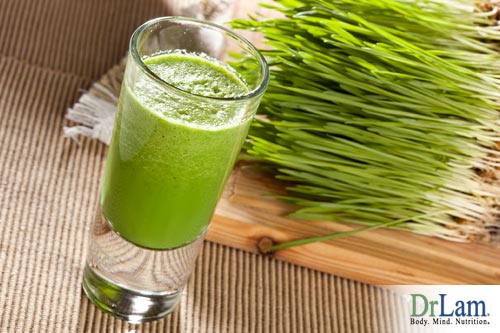
Has been known to kill every cancer and bacteria tested, as well as a major fighter against disease.
Known to increase sexual function
If a side of beans or a slice of bread makes your stomach inflame instantaneously after just a small bite, there might be a solution for you. You no longer have to avoid eating certain foods that you love. If they are sprouted and processed properly, you can still enjoy their taste if not eaten in excessive amounts.
A new lifestyle and dietary changes should always be researched and discussed with a trusted doctor or nutritionist to ensure a safe transition. If you have been diagnosed with a gluten intolerance or wheat allergy, it is always safer to avoid triggers to the bodies system. Eliminate already known causes of inflammation and irritations.
© Copyright 2017 Michael Lam, M.D. All Rights Reserved.
Absolutely, sprouted wheat increases many of the grain’s essential nutrients, including B-vitamins, Vitamin C, soluble fiber and essential amino acids. Sprouting rye even increases its folate content up to 3.8 fold!
